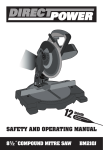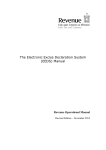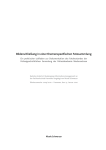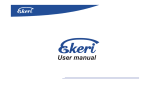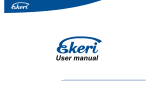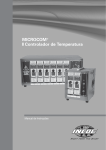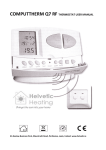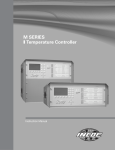Download Masterflex HANDY-700 Operating instructions
Transcript
seepex Inc. 511 Speedway Drive Enon, Ohio 45323 Tel +1 (937) 864-71 50 Fax+1 (937) 864-71 57 [email protected] www.seepex.com Operating and Assembly Instruction Progressive Cavity Pump 24h Helpline: www.seepex.com Commission No. Type BW 5 Job# 2100000 Read instructions before beginning any work! Issue: 03.31.2009 Always keep instructions handy on the worksite. sc Operating and Maintenance Instructions Progressive Cavity Pump index item 1. 0. 0 2. 0. 0 3. 0. 0 4. 0. 0 5. 0. 0 6. 0. 0 7. 0. 0 8. 0. 0 9. 0. 0 9. 0. 0 10. 0. 0 document denomination OM.CON.02e OM.GEN.01e OM.SAF.01e OM.TRA.01e OM.DES.01e OM.INS.08e OM.COM.01e OM.MAI.99e OM.PJT.16e OM.HBD.01e OM.REC.01e OM.ACC.01e 106-003B2 OM.SEA.02e OM.WPS.99e OM.SPT.01e TI.FRU.01e TI.114.01e 99. 0. 0 OM.ADR.01e Declaration of conformity group N General Safety Transport and Intermediate Storage Description of the seepex pump and Accessories Assembly and Installation Commissioning/De-commissioning Service and Maintenance Pin Joint Assembly Range BW10 Holding Band Re-assembly Breakdown, reasons, remedies Auxiliary seepex documentation data sheet sectional drawing Part list Shaft Sealing Wearing parts and Gaskets Tools Electrical Connection of Frequency Inverters Long-Term Preservation Manufacturer's documents from sub-supplier geared motor seepex Subsidiaries technical notes dimension for stator replacement 'P ref.item 5.2.1.3 special grease for pin joint ref.item 7.2.1.3 240 mm Typ 30321 14 cm3 2 EC Declaration of Conformity complying with the Machinery Directive 98/37/EC, Appendix II A Manufacturer: Address: seepex GmbH Scharnhölzstrasse 344 D-46240 Bottrop We hereby declare that the following product Progressive cavity pump of ranges • BN, BE, BK, BS, BC, BCSB, BCSO, BW, BA, MD, MDC, MDF, MDP as block pump complete with flanged drive and ranges • NS, N, S, C, CSB, CSO as pump with free bareshaft, with drive as pump with drive preassembled on a common baseplate meets the regulations of the above mentioned directive as well as its amendments which are valid at the time of declaration. The following harmonized standards are applicable: DIN EN ISO 12100-1 DIN EN ISO 12100-2 DIN EN 294 DIN EN 809 DIN EN 811 Safety of machinery Part 1 Safety of machinery Part 2 Safety distances to prevent danger zones being reached by the upper limbs Pumps and pump units for liquids Safety distances to prevent danger zones being reached by the lower limbs The appertaining operating instruction includes important safety advices and rules for installation, commissioning and maintenance of the seepex machinery. The safeguarding of the machinery against inadmissible pressure, dry running and wrong direction of rotation must be ensured at site. Bottrop, 16.09.2005 i.V. Klemens Fockenberg Manager Engineering seepex GmbH Rechtsform: GmbH HRB 9350 Gelsenkirchen i.V. Roland Hecker Manager Quality Assurance seepex GmbH Geschäftsführender Gesellschafter: Ulli Seeberger 3 seepex GmbH Scharnhölzstraße 344 46240 Bottrop Postfach 10 15 64 46215 Bottrop PO Box 10 15 64 46215 Bottrop Germany Tel +49.2041.996-0 Fax +49.2041.996-400 [email protected] www.seepex.com General 1.0 General 1.2.7 EEC Machine Directive 1.1 Application 1.2.7.1 Manufacturer's Declaration These operating instructions contain basic information on the installation, commissioning and maintenance of seepex machines. Compliance with the work steps described in the individual sections is essential. seepex Manufacturer's Declaration as required by the EEC Machine Directive 89/392/EEC, Appendix II B: 1.2 Details of the seepex machines 1.2.1 Operating Instructions The seepex machines delivered in accordance with our design are intended to be fitted in one machine or assembled together with other machines to form one machine/plant. The commissioning of the machine is forbidden until such a time as has been established that the entire machine/plant satisfies the requirements of the EEC Directive for Machines as amended 91/368/EEC and 93/44/EEC. The Commission Number (comm. no) assigns the operating instructions to a particular seepex machine. The operating instructions are produced in relation to a specific job/commission and are valid only for the machine whose comm. no. is identical with that indicated on the cover sheet and possessing the associated data sheet, Point 9. Particular attention must be paid to the safety requirements specified in EN809 (s and Equipment for Fluids) as well as the information in these operating instructions. 1.2.2 Manufacturer seepex machines possessing no safety accessories do not fulfill the requirements of the EEC Machine Directive 89/392/EEC as amended 91/368/EEC and 93/44/EEC. The machines were manufactured by seepex. 1.2.3 Range, Size, Version For this reason, no Declaration of Conformity as required by the EEC Machine Directive 89/392/EEC, Appendix IIA can be issued before appropriate safety devices have been installed/mounted on the machine and/or plant with due regard to the information given in these operating instructions. of the machines are stated in the appended data sheet, Point 9. 1.2.4 Machine Comm. No. and Year of Construction The following harmonized standards are particularly applicable: EN 809, EN292T1, EN292T2 Applicable national standards and specifications must be taken into consideration. are stated on the type plate at the machine. 1.2.5 Release Date of the Operating Instructions is stated on the cover sheet of the operating instructions. 1.2.6 Modifications, Notes of Modification If modifications to the machines are carried out in agreement with seepex, a new set of operating instructions will be provided, or the existing operating instructions will be supplemented by an additional sheet together with a new cover sheet. The date of modification and modification index will be noted on the new cover sheet. Ausgabe issue A / 10.12.1994 1.2.7.2 Declaration of Conformity Dokument document 4 Following assessment of the conformity of the machine/plant with the EEC Machine Directive, customers may on their own initiative place on the full machine/plant the EEC symbol 'CE' as defined in Identification Directive 93/68/EEC. CAUTION This documentation must be kept available for at least 10 years. OM.GEN.01e Blatt sheet 1 (2) General 1.2.8 Copyright and Industrial Property Rights 1.3.2 Company Address, Service Addresses These operating instructions are copyrighted. The reproduction, in particular by photocopying, of these instructions is not permitted (§§ 54, 54 UrhG) and constitutes a criminal offence (§ 106 UrhG). Proceedings will be instituted if the copyright is violated. see Point 11 1.2.9 Specifications Required for Inquiries and Orders The following information must be included when inquiring about replacement parts or placing orders: - comm. no. - / machine type This information is given on the type plate mounted the machine. 1.2.10 Technical Data Sheet see Point 9. 1.2.11 Performance Data, Load Index, Power Consumption are indicated in the associated data sheet, Point 9. 1.2.12 Sound Pressure Level The sound pressure level and/or noise characteris-tics of the seepex machines are ascertained in accordance with DIN 45635. The measuring guidelines are largely identical with the international standards ISO 3740-1980 and ISO 3744-1981. 1.2.13 Operating Range Employment of the machine is not permissible for purposes other than those stated in the data sheet, see Point 9. seepex cannot accept liability for damage arising through failure to comply with this operating range. 1.3 Supplementary Information 1.3.1 Accessories, Optional Extras Please refer to the data sheet, Point 9. Ausgabe issue A / 10.12.1994 Dokument document 5 OM.GEN.01e Blatt sheet 2 (2) Safety 2.0 Safety 2.2 Personnel Qualifications and Training These operating instructions contain basic requirements to be observed during the installation, operation and maintenance of the machine. Therefore, the instructions must be read by the mechanical fitter and by the technical personnel/operator responsible for the machine prior to assembly and commissioning, and kept available at the operating site of the machine/plant at all times. Personnel charged with operation, maintenance, inspection and assembly must be in possession of the appropriate qualifications for the tasks. The company operating the machine must define exact areas of responsibility, accountabilities and personnel supervision schemes. Personnel lacking the required skills and knowledge must receive training and instruction. If necessary, the opera-ting company may commission the manufacturer/ supplier to conduct these training courses. Furthermore, the operating company must ensure that the personnel fully understand the contents of the operating instructions. Compliance is required not only with the general safety instructions given in this section but also with the detailed instructions, e.g. for private usage, given under the other main headings in these operating instructions. 2.1 Labeling of Advice in the Operating Instructions In these operating instructions safety advice whose non-observance could lead to danger for life or limb is labeled with the following general hazard symbol: 2.3 Dangers Resulting from Failure to Observe Safety Instructions Failure to comply with the safety instructions may lead to hazards to life and limb as well as dangers for the environment and the machine. Non-observance of safety instructions can invalidate the right of claim to damages. The following are just some examples of possible dangers resulting from failure to comply with the safety instructions: safety symbol acc. to ISO 3864 - B.3.1 Warnings regarding electric power are labeled with: - Failure of important machine/plant functions - Failure of prescribed methods of service and maintenance - Danger to life and limb due to electrical, mechanical and chemical influences safety symbol acc. to ISO 3864 - B.3.6 Safety instructions whose non-observance could jeopardize the machine and its functions are labeled by the word CAUTION Always comply with instructions mounted directly on the machine, e.g. - rotational direction arrow - fluid connection indicators - Danger to the environment due to the leakage of hazardous substances 2.4 Safety-conscious Working Always comply with the safety instructions listed in this document, the existing national accident prevention regulations and any company-internal work, operating and safety rules. and ensure that the information remains legible. Ausgabe issue B / 21.04.1999 Dokument document 6 OM.SAF.01e Blatt sheet 1 (2) Safety 2.5 Safety Instructions for the Operating Company/Machine Operator 2.7 Unauthorized Modification and Manufacture of Replacement Parts - Any potentially hazardous hot or cold machine parts must be provided with protection against accidental contact at the customer´s premises. Conversions or modifications of the machine are permissible only in consultation with the manufacturers. Original manufacturer replacement parts and manufacturer-approved accessories enhance the operational safety of the machine. The usage of unauthorized parts may lead to the nullification of the manufacturer's liability for any resultant damages. - Protective guards for moving parts (e.g. coupling) must never be removed while the machine is in operation. - Leakages (e.g. in the shaft seal) of hazardous conveying liquids (e.g. explosive, toxic, hot) must be drained in such a way that no danger arises for persons or for the environment. Always observe the relevant statutory requirements. - The risk of exposure to electrical power must be eliminated (for details, see the VDE regulations, for example, or those of the local power supply company). 2.8 Impermissible Modes of Operation The operational safety of the machines supplied is warranted only for employment in accordance with the intended use as defined in Section 1 - General of these operating instructions. Never allow the threshold values specified in the data sheet to be exceeded. 2.6 Safety Instructions for Maintenance, Inspection and Assembly Work The operator must ensure that all maintenance, inspection and assembly tasks are carried out by authorized and qualified personnel who have studied the operating instructions closely and become sufficiently familiar with the machine. As a basic rule, the machine must be brought to a standstill before work is carried out. Always comply with the de-commissioning procedure described in this document. Any machines or assemblies conveying media that are detrimental to health must be decontaminated. Immediately following completion of work, all safety and protective devices must be replaced in position and, where applicable, re-activated. Before re-starting the machine, observe the points listed under the heading "Initial Startup". Ausgabe issue B / 21.04.1999 Dokument document 7 OM.SAF.01e Blatt sheet 2 (2) Transport and Intermediate Storage 3.0 Transport and Intermediate Storage 3.1 Safety Precautions Employ appropriate transport means, hoists and tools when transporting and storing the machine, always observing the safety instructions. 3.2 Transport Depending on its weight, the seepex machine must be transported manually or with appropriate transport means. Comply with the transport instructions on the packing. 3.3 Unpacking The design of the packing is such that the equip-ment can be removed manually or, if demanded by the weight, by means of appropriate hoists. Any screw fittings between the machine and the packing must be undone. Comply with the attached information notices and symbols. 3.4 Intermediate Storage/Preservation Unless otherwise indicated in the data sheet, seepex machines are provided with preservation only for the duration of transport. If a long period of intermediate storage is foreseen before the machine is commissioned, it is necessary to pro-vide supplementary preservation. If necessary, the appropriate measures should be drawn up in consultation with seepex. Intermediate storage in extreme climatic conditions is permissible only for machine whose design is appropriate to the circumstances. If necessary, seepex must be consulted. CAUTION Pumps of the range MAP If the period from supply and subsequent storage until the commissioning is more than 4 weeks, the hoses should be dismantled, refer to Point 7. 3.5 Protection against Environmental Influences To afford protection against environmental influences, the intermediate storage location must be dry, enclosed and free from frost. Ausgabe issue B / 14.08.1998 Dokument document 8 OM.TRA.01e Blatt sheet 1 (1) Description 4. Description of the seepex Progressive Cavity Pump and Accessories 4.5 Design Variants 4.1 General Description, Design and Mode of Operation Like all progressive cavity pumps, seepex pumps belong to the rotating positive-displacement pump family. The characteristic attribute of these pumps is the special formation and arrangement of the two conveying elements, namely the rotor and the stator. Refer to the data sheet, Point 9, for the design of the seepex progressive cavity pump. Other design variants are possible, whereby seepex must first check whether a particular pump is suitable for the intended purpose. 4.6 Operating Site Specifications Operating site specifications are listed in the data sheet, Point 9. Details of the space required for installation, operation and maintenance are given in Point 5.2.1. The difference in the number of threads possessed respectively by the rotor and stator produces a chamber that opens and closes alternately in line with the constant turning motion of the rotor, effecting the continuous transportation of the conveying product from the suction side to the pressure side. The geometrical formation of the two conveying elements combined with the constant contact that exists between them result in sealing lines that effect an airtight seal between the suction and pressure side in every position of the eccentric screw, even when the pump is stationary. The pump owes its high suction capacity to this sealing between the suction and pressure sides. 4.2 Mechanical Design Please consult the sectional drawing, Point 9, for the mechanical design of the pump. The data sheet, Point 9, gives information on the design of the pump housing, stator, rotor and rotating components. Refer to document OM. SEA. __, for information on the design of the shaft seal. The data sheet, specifies details of the design of the drive engine. Further details are given in the appended manufacturer's documents, Point 10. 4.3 Accessories Consult the data sheet for information. 4.4 Dimensions, Weight Consult the appended dimensional drawing, Ausgabe issue A / 10.01.1995 Dokument document 9 OM.DES.01e Blatt sheet 1 (1) 5.0 Assembly/Installation BW 5.1 Mounting tools/lifting gear CAUTION Pump falling over Slight injury or damage to property may result. Adhere to the lifting tool’s starting point. Pay attention to the dimensions, weight and centre of gravity of the pump Use suitable mounting tools/lifting gear. 5.2 Required space The required space should be determined by considering the following factors: • Dimensions and weight. • Requisite transport and lifting equipment. • Pipe routing – dismantling (stator construction dimensions). 5.3 Stator construction dimensions (P) • Refer to the dimensional drawing. 5.4 Erection of the complete mounted pump Erect in accordance with technical data (Chapter 3.0). Heed dimensional drawing. Tension-free mounting of the pump Balance unevenness with suitable supports. • Applies to mounting on foundations/load-bearing elements. • Total areas of all pump bearing areas are resting on the surface. Correct position of the drives • All drives are set up ready for operation and mounted. • Correct slipping of the drive during transport/installation of the pump by adjusting/fixing the drive motor. CAUTION Safety protection equipment. Slight injury or damage to property may result. Connect safety protection equipment and activate. Ausgabe issue A / 23.01.07 Dokument document OM.INS.08e 10 Blatt sheet 1 (2) 5.0 Assembly/Installation BW 5.5 Energy supply to the seepex pump DANGER Supply voltage and power frequency Death or serious injury will result. Heed type plate on the pump. Pay attention to manufacturer’s directions (Chapter 14.0). Pay attention to safety regulations. 5.6 Pipe work 5.6.1 Suction and pressure connection • Refer to the dimension drawing for the position, nominal pipe size and norm. • Heed rotational direction/direction of flow. 5.6.2 Dimensioning of pipe work • Adhere to specifications regarding pressure in the pressure or suction connection. • Heed technical data (Chapter 3.0). • Nominal pipe size of suction pipe = nominal pipe size of suction connection of pumps 5.6.3 Residue-free pipe work NOTICE Damage to property through assembly residue No claims under guarantee if violated. Keep all pipe work free of foreign objects. Remove weld spatters, screws, steel chips etc. 5.6.4 Tension-free mounting Assemble pipe work and other components in a tension-free manner. Ausgabe issue A / 23.01.07 Dokument document OM.INS.08e 11 Blatt sheet 2 (2) Commissioning/ De-commissioning 6.0 Commissioning/De-commissioning 6.2.5 Checking Direction of Rotation 6.1 Engineering Data The rotational direction of the pump determines the flow direction of the conveying medium. Details regarding all technical specifications and operating conditions are given in these operating instructions together with the data sheet, Point 9. Flow direction Flow direction To guarantee the correct assignment of documentation to pump, the commission number on the cover sheet and data sheet of these operating instructions must match the commission number stated on the nameplate of the pump. counter-clockwise clockwise 6.1.1 See Point 7.2.2 for Lubricant Chart Prior to commissioning the rotational direction of the pump must be checked for compliance with the data sheet specification and the rotational direction arrow on the type plate of the pump. 6.2 Preparation for Operation 6.3 Control and Monitoring Equipment 6.2.1 Bearing Where applicable, please refer to the associated documents, Point 10, for information on commissioning. 6.2.1.1 See Point 7.2.1.4 for pump bearing. 6.3.1 Performance Check 6.2.1.2 See manufacturer's documents, Point 10, for drive bearings. Any optional extras must be subjected to a performance check in conformity with the specifications by seepex or other manufacturers, see manufacturer's documents. 6.2.2 Shaft Sealing 6.3.2 Setting See document OM.SEA.__,. 6.2.3 Filling Up of Suction Side to Avoid Dry Running at Startup CAUTION Before switching on the pump, fill the suction-sided pump casing with fluid so that the first rotations will lubricate the conveying elements immediately. A small quantity of fluid is sufficient for lubrication; the subsequent operation of the pump is self-priming, even if an air column up to the liquid level remains. Unless already performed in the factory, setting must be carried out in accordance with the appended manufacturer's specifications, Point 10. Pay attention to the operating specifications in the data sheet. 6.2.4 Electric/Hydraulic Connections The connections are listed in the appended manufacturer's documents, Point 10. The risk of exposure to electrical hazards must be ruled out. Always observe the safety regulations valid at the site of installation. Ausgabe issue B / 06.01.1997 Dokument document 12 OM.COM.01e Blatt sheet 1 (3) Commissioning/ De-commissioning 6.4 Equipment for Protection of Persons For this reason it is necessary to ensure that the suction-sided flow never dries up completely. If a continuous flow cannot be guaranteed for the plant, it is essential to fit the seepex dry running protection device TSE, available as an optional accessory. Machines must be fitted with mechanical protective devices complying with DIN EN 809. Moving or working parts must be protected against accidental contact. 6.5.3 Check Pressure at Suction and Pressure Flanges However, safety considerations demand it be possible at all times to check without hindrance whether the shaft seal is fully functional. A protective guard is necessary in this area only if components are mounted on the rotating, smooth shaft. 6.5.3.1 Safeguard Pump Against Excessive Pressure at the Suction Flange The seepex pump is designed to operate with the pressure at the suction flange (suction head or inlet pressure) specified in the data sheet. Deviating pressure conditions may lead to the failure and/or destruction of the shaft seal or entire pump. If pumps are operated with an open suction flange/feed hopper, a suitable protective guard complying with DIN EN 294 must be mounted. Country-specific protective regu-lations must be observed at the site of installation. Prior to activation of the pump, check the proper function of all protective equipment. For this reason the suction pressure specified in the data sheet must be guaranteed. Appropriate monitoring devices are oil-filled contact manometers that deactivate the pump. 6.5.3.2 Safeguard Pump Against Excessive Pressure at the Pressure Flange 6.5 Commissioning 6.5.1 Initial Startup/Re-starting CAUTION Every seepex progressive cavity pump is designed for the specific operating conditions documented in the data sheet. Commissioning is permissible only if the operating conditions conform with those indicated in the data sheet. Although the potential usages of the seepex pump are not confined to the specified operating conditions, any change in the original conditions must be checked and approved by seepex. The right to make claims under the warranty agreement will be annulled if operating conditions are changed without prior approval by seepex. 6.5.4 Drive Engine 6.5.2 Avoid Dry Running of Pump CAUTION The dry running of a pump increases the friction between rotor and stator, quickly causing an unacceptably high temperature to develop on the inner surface of the stator. This overheating leads to burning of the stator material and the total failure of the pump. Ausgabe issue B / 06.01.1997 The seepex pump operates according to the positive displacement principle. Operation of the pump against an excessive pressure caused by closed valves, by high pressure losses in the piping or by product sedimentation will lead to the destruction of the pump, drive, pipe work and/or downstream equipment. Every progressive cavity pump must therefore be protected against overpressure. Safety valves with bypass pipes or oil-filled contact manometers that disactivate the pump are appropriate protective devices. Dokument document 13 Consult the attached manufacturer's operating instructions, Point 10, for information on commissioning the drive engine. OM.COM.01e Blatt sheet 2 (3) Commissioning/ De-commissioning 6.5.5 Establish Clear Passage Through Pipelines CAUTION To prevent damage to the pump the unhindered flow of liquid must be guaranteed between the points of entry to and exit from the pipeline. For this reason, open all relevant valves etc. prior to activation of the pump. 6.6 De-commissioning 6.6.4 Disassembling the Pump Dismantle the pipe work by removing the flange bolts (SCH) and flange seals (DFL) or the threaded connections (G). Disassemble the pump together with the baseplate (GPU) or, as applicable, without the baseplate (GPU) following removal of the bolts (SCH) at the pump feet. Block-design pumps with direct flangemounted drive engine are liable to become unstable during disassembly. Stability can be restored by propping up the drive engine. 6.6.1 De-activation The electric connections must be switched off and protected against accidental re-activation. Observe the safety regulations applying to the plants. 6.6.2 Stationary Pump The pump and all optional equipment must be provided with the following protection modes while at a standstill: - Frost protection Protection against solid particle deposits Protection against sedimentation of the medium Corrosion protection for parts in contact with the medium We recommend that the pipeline and pump be emptied for the duration of the plant standstill. Following evacuation, the pump should be preserved. 6.6.3 Evacuation of the Pump The pipeline must be evacuated on the suction and pressure side or shut-off directly behind the pump connections. Drain any residual liquid in the pump casing by opening/ removing the screwed sealing plugs (705) and (502), sealing rings (706) and (503). Casings without screwed plug must be evacuated by the connection branch (SAG and DRS). Refer to the data sheet and the sectional drawing of the associated operating instruction, Point 9, for information on the pump design. Conveying medium residues always remain in the rotor/ stator chambers and may run out during transport or disassembly of the pump. If conveying aggressive or hazardous media, therefore, wear appropriate protective gear during all installation work. Ausgabe issue B / 06.01.1997 6.6.5 Preservation/Storage The pump must be preserved prior to storage. Appropriate preservation measures must be agreed with seepex. Always state the pump commission number when making inquiries. Dokument document 14 OM.COM.01e Blatt sheet 3 (3) 9.1 Demontage/ Wiedermontage Pumpe Range: Size: 9.1.1 BW 5-10 Prepare the pump for dismantling DANGER Dangerous voltage. Death or serious injury will result. Heed safety regulations. Disconnect pump from all sources of energy. Secure electrical connections against restarting. Empty pipes. Allow pipes to cool down. Remove pipe connections (suction side/pressure side). Heed decommissioning (Chapter 6._). 9.1.2 Demontage WARNING Tilting or falling pump Injuries and/or damage to equipment. Death or serious injury can result. Secure the pump. 9.1.2.1 Druckstutzen (700) – Demontage Dismantle pressure branches (700). 700 9.1.2.2 602 606 604 Stator (601) – dismantling Remove stator (601) from suction casing (500). 601 Ausgabe issue A / 23.01.07 Dokument document OM.MAI.99e 15 Blatt sheet 1 (4) 500 9.1 Demontage/ Wiedermontage Pumpe 9.1.2.3 Suction Casing (500) – dismantling Dismantle suction casing (500). Remove casing gasket (501). 500 210 212 9.1.2.4 501 Rotor (600) – dismantling Remove Rotor (600) from plug in shaft (307). Dismantling of joint (G) - Rotating unit – individual parts (Chapter 9_) 600 9.1.2.5 G 307 Mechanical Seal (SEA) – dismantling Detasch set screws (378). Dismantle set collar (372), Mechanical seal (SEA) and mechanical seal retainer (333). Dismantle shaft sealing (Chapter 9._) 372 9.1.2.6 378 SEA 333 Plug in Shaft (307) – dismantling 307 309 Tool (W26/assembly mandrel) Remove plug in shaft pin (309) from plug in shaft (307) with tool (W26). Remove plug in shaft (307). Ausgabe issue A / 23.01.07 Dokument document OM.MAI.99e 16 W26 Blatt sheet 2 (4) 9.1 Demontage/ Wiedermontage Pumpe 9.1.3 Reassembly WARNING Tilting or falling pump/pump parts Injuries and/or damage to equipment. Death or series injury may result. Secure the pump. CAUTION Danger of fingers being crushed Slight injury may result. Do not grasp between connections. 9.1.3.1 Plug in Shaft (307) – reassembly FLS Clean the flange mechanism surfaces (FLS) and output pivots of the drive (ANT). ANT Slide on plug in shaft (307). 307 W26 309 Tool (W26/assembly mandrel) Insert the plug in shaft pin (309) into the plug in shuft with tool (W26). 9.1.3.2 Mechanical Seal (SEA) - reassembly Tool (W27/Mounting sleeve with assembly mandrel) Gleitringdichtungs-Aufnahme (333), Gleitringdichtung (SEA) und Stellring (372) auf Steckwelle (307) schieben. Secure Mechanical Seal (SEA) with tool (W27).. W27 372 SEA 333 307 Tighten the set collar (372) with set screws (378). 378 Ausgabe issue A / 23.01.07 Dokument document OM.MAI.99e 17 Blatt sheet 3 (4) 372 9.1 Demontage/ Wiedermontage Pumpe Tool (W27/Mounting sleeve with assembly mandrel) W27 Dismantle tool (W27).. 9.1.3.3 Rotor (600) – reassembly Assmble rotor (600). Joint (G) reassembly - Rotating unit – individual parts (Chapter 9_). 600 9.1.3.4 G Sauggehäuse (500), Sauggehäusedichtung (501) – reassembly SH Provide rotor (600) with protective cover (SH). Slide on casing gasket (501). Assemble and adjust the pressure casing (500) (water level). 500 210 212 501 600 9.1.3.5 Stator (601) – reassembly Support rotor (600) with base (S) to prevent it falling down. Add lubricant (liquid soap) to the opening on the pressure branch side between the rotor (600) and stator (601). Turn rotor (600) in the “right” rotating direction. Add lubricant (liquid soap) to the opening on the pressure branch side between the rotor (600) and stator (601). Turn Stator (601) in the „right“ rotating direction and slide on the rotor (600). Slide on the Stator (601) up to the collar of the pressure casing (500). 9.1.3.6 601 600 500 Suction branch (700) – reassembly Assemble suction (700) branch. 700 Ausgabe issue A / 23.01.07 Dokument document OM.MAI.99e 18 Blatt sheet 4 (4) 602 606 604 9.2 Rotating Unit Individual Parts 9.2.1 Dismantling 9.2.1.1 Dimantling of holding band (406, 407) CAUTION Danger of injury Possible ejection of parts. Slight injury or damage to property may result. Wear protective goggles. 407 Detach holding band strap (SCL). - Use suitable tool (WM). Push out strap part of holding band (SCL). Remove holding band (406, 407). 9.2.1.2 406 Universal joint sleeve (405) – dismantling 405 Pull back universal joint sleeve (405). 9.2.1.3 Retaining sleeve (401) – dismantling 401 WM Knock back retaining sleeve (401). - Use suitable tool (WM). 9.2.1.4 Detach joint Eject coupling rod pins (402). Remove Rotor (600). 600 403 W5 403 402 Tool (W5/ Drift) A Knock guide bushing (403) out with tool (W5). Ausgabe issue A / 21.03.07 Dokument document OM.PJT.16e 19 Blatt sheet 1 (3) SCL WM 9.2 Rotating Unit Individual Parts 9.2.2 Rotating unit (RTE) – prepare individual parts for reassembly 9.2.2.1 Rotor (600) Remove existing damage. Clean the rotor (600). Tool (W4/assembly mandrel) 403 W4 403 600 403 W4 403 307 Press in the guide bushing (403) - Use tool (W4). 9.2.2.2 Plug-in shaft (307) Remove existing damage. Clean the plug-in shaft (307). Tool (W4/assembly mandrel) Press in the guide bushing (403) - Use tool (W4). 9.2.3 Rotating unit (RTE) – individual parts – reassembly HINWEIS Faulty functioning of joints Malfunctioning and/or destruction of joints. Damage to property may result. Replace the coupling rod pins (402) and guide bushing (403) jointly. 9.2.3.1 Rotor (600) / Plug in shaft (307) – reassembly Slide the universal joint sleeve (405) onto the Rotor (600). Fill the joint head with seepex joint grease. Side on retaining sleeve (401). Insert coupling rod pins (402). Connect the Rotor (600)/plug in shaft(307). Slide in coupling rod pins (402). 600 405 600 405 401 402 Tool (W5/ Drift). Knock the guide bushing (403) in. - Use tool (W5). Ausgabe issue A / 21.03.07 Dokument document OM.PJT.16e 20 Blatt sheet 402 307 2 (3) 307 W5 403 9.2 Rotating Unit Individual Parts 9.2.3.2 Retaining sleeve (401) - reassembly W4 401 Tool (W4/ assembly mandrel) Knock back the retaining sleeve (401). • Use tool (W4). 401 307 Secure the retaining sleeve (401) in a displaced manner (2x180°). • Use suitable tool (WK). Tool (W15/Mounting plate) Remove tool (W15). 9.2.3.3 Universal joint sleeve (405) – reassembly 600 405 Moisten the surface of the coupling rod (400)/ interior of the universal joint sleeve (405) with joint grease (maintenance, Chapter 7.0). Slide on the universal joint sleeve (405). 405 WS Vent the inside area of the joint. Use suitable tool (WS). 407 405 406 Assemble holding band Holding band assembly (Chapter 9._). Ausgabe issue A / 21.03.07 Dokument document OM.PJT.16e 21 Blatt sheet 3 (3) WK Holding Band Re-assembly • Correct holding band tension (HBD) Holding Band (HBD) - Assembly Tools required for the re-assembly, see document OM.SPT.01. • Prepare holding band Only prefabricated double-band holding bands should be used. The diameter ( ) and in particular the breadth (b) of the holding band is matched to the universal joint sleeve. • Test holding band The bent holding band (HBD) must fit against the holding band loop (SCL), if necessary apply pressure with the tool/pliers (WZ). Correct Holding band (HBD) has slightly contracted outer form of univers-al joint sleeve and is stuck in position. Incorrect Holding band (HBD) is too slack and liable to slip. Incorrect Holding band (HBD) is too tight. Universal joint sleeve will be damaged/sheared off. • Folding back the holding band (HBD) Slowly swivel mounting tool upward by 60°, at the same time slackening the crank (KU) by approximately one half revolution. Swivel cutting lever (SH) forward until the pressure plate fits against the holding band loop (SCL). • Assembly of holding band Insert holding band in tool (W3/ see Point 9). Hold free end of holding band with control lever (EX), turn crank (KU) until the holding band is strained and fitting against the holding band loop (SCL). Carefully contract holding band until it fits inside the circular groove of the universal joint sleeve. Ausgabe issue A / 23.02.1995 Dokument document 22 OM.HBD.01e Blatt sheet 1 (2) Holding Band Re-assembly • Shearing off holding band (HBD) made of material AISI 304 and AISI 316 A blow with the palm of the hand against the cutting lever (SH) causes the end of the holding band behind the loop (SCL) to be folded back and sheared off. If the holding band on the sheared off side is slightly raised as a result, it must be straightened carefully. CAUTION Never tap or hammer against the loop of the holding band (SCL), otherwise damage to the universal joint sleeve may occur. • Shearing off holding band (HBD) made of Hastelloy C The high strength of this material makes it impossible to shear off the holding band (HBD) with the cutting lever (SH). Once the end of the holding band is folded back, cut off the holding band (HBD), file off projecting edges and remove burr. • Check after mounting of holding band The holding band must run all the way round the groove of the universal joint sleeve. The holding band (HBD) must be bent back and sheared off at the holding band loop (SCL) in such a way that the holding band (HBD) is unable to slip back through the holding band loop (SCL). If this has not been accomplished, then the holding band (HBD) must be replaced by a new one. Ausgabe issue A / 23.02.1995 Dokument document 23 OM.HBD.01e Blatt sheet 2 (2) Breakdown, Reasons, Remedies pump has no suction pump conveys irregularly the conveying capacity is not achieved pressure is not achieved pump does not start pump has seized or has stopped conveying pump operates noisily motor becomes too warm the stator wears out early shaft sealing leaks Breakdown 1 2 3 4 5 6 7 8 9 10 X seepex progressive cavity pumps will operate trouble-free if they are used in accordance with our data sheet (see item 9) and our operating and maintenance instructions: X a X b X X X X X X X X X X X X X X X X X X X c X d e X X X X X X X X f g X h X i X j X k X X X X X X X X X X X X X Reasons / Remedies X X l X m X X n X X X X o X X p X X X q X r X X X X X X X X X X X X X X Ausgabe issue X s t X X u X X v X w X x X y A / 05.01.1995 Adhesion between rotor and stator excessive (as delivered). Lubricate (soft soap, genuine soap) between stator and rotor. Then turn the pump by means of the tool W2 . Check rotational direction of the pump per data sheet and nameplate. In case of wrong direction, change wiring of motor. Suction pipe or shaft sealing leak. Eliminate the leakage. Suction head too high (item 6.5.3.1). Check suction head with vacuum gauge. Increase the suction pipe diameter and fit larger filters. Open the suction valve fully. Viscosity of the liquid too high. Check and accommodate per data sheet. Wrong pump speed. Correct pump speed per data sheet. Avoid inclusions of air in the conveying liquid. Pressure head too high (point 6.5.3.2). Check pressure head with manometer. Reduce the pressure head by increasing the pressure pipe diameter or by shortening the pressure pipe. Pump runs partially or completely dry (point 6.5.2). Check flow in the suction chamber. Install dry running protection TSE. Check coupling, possibly pump shaft is misaligned to drive. Check whether coupling gear is worn. Realign coupling. The coupling gear has perhaps to be replaced. Speed too low. Increase the speed when high suction performances are required and when the liquid is very thin. Speed too high. Reduce the speed when pumping products with high viscosities - danger of cavitation. Check the axial play in the coupling rod linkage. Check that the bush has been installed correctly see document OM.PJT.__. Check for foreign substances in the pump. Dismantle the pump, remove foreign substances and replace worn parts. Stator or rotor worn. Dismantle the pump and replace defective parts. Joint parts worn. Replace worn parts and fill with special pin joint grease . Suction pipework partially or completely blocked. Clean suction pipework. Temperature of the pumping liquid too high. Excessive expansion of the stator. Check temperature and install rotor with diameter smaller than specified. Gland packing too strongly tightened or worn. Ease or tighten stuffing box. Replace defective packing rings. Solid contents and/or size of solids too large. Reduce pump speed and install perhaps a screen with suitable meshes. Increase fluid share. When the pump is non operational the solids settle out and become hard. Clear and flush the pump immediately. The liquid becomes hard when temperature falls below a certain limit. Heat the pump. Stator swollen and unsuitable for the pumped liquid. Select a suitable stator material. Use perhaps rotor with diameter smaller than specified. The bearing in the drive casing of the pump or in the drive engine is defective. Replace bearing. Mechanical seal defective. Check seal faces and O-rings. If necessary replace corresponding defective parts. Dokument document 24 OM.REC.01e Blatt sheet 1 (1) Auxiliary seepex documentation 9.0 Auxiliary seepex documentation Ausgabe issue A / 03.05.1995 Dokument document 25 OM.ACC.01e Blatt sheet 1 (1) Single-Acting Mechanical Seal 1.0 General 4.0 Flushing or circulation of single-acting mechanical seals • Please take the appertaining drawing from respective pump data sheet. • The mechanical seal is suitable for the operating conditions indicated in the pump data sheet. Modifications are only admissible after the customer has consulted with seepex. Additionally, attention must be paid to the manufacturer’s operating manual. 2.0 Safety Any mode of operation impairing the operating safety of the mechanical seal has to be avoided. The operator is advised to consider the possible effects on the environment which could be caused by a defective mechanical seal and what additional measures must be taken to protect the environment and the public. The pump must be mounted and operated in such a way that operation with a defective mechanical seal will not result in injury or harm to the public and that any leakage can be safely and properly dealt with. Single-acting mechanical seals contacting the conveying liquid require no additional flushing or a circulation pipe because sufficient flushing and heat exchange occurs around the seal due to the conveying liquid. However, in particular cases, a direct flushing pipe can be installed into the flushing connection on the mechanical seal housing. 5.0 Commissioning Regardless of the pump's operating status, the conveying medium to be sealed must always be in liquid form at the mechanical seal. This particularly applies to the pump's commissioning and its placing out of service. 6.0 Maintenance When operating the pump according to the instructions, no maintenance is required. Mechanical seals are often used to seal hazardous material (chemicals, drugs, etc.). It is essential that rules pertaining to the handling of hazardous materials are adhered to. Modifications effected by the customer himself and changes influencing the safety of the mechanical seal are not allowed. 3.0 Emissions A mechanical seal is a dynamic seal and leakage is unavoidable. ATTENTION Components that may contact leakage must be resistant to corrosion or be protected accordingly. Mechanical seal leakage must be drained in a safe and proper manner. Ausgabe issue A / 10.02.1995 Dokument document 30 OM.SEA.02e Blatt sheet 1 (2) Single-Acting Mechanical Seal 7.0 Disassembly / Reassembly 7.2 Reassembly 7.1 Disassembly ATTENTION Mechanical seals are precision parts of high quality. Therefore, the installation must be effected with care. Gentle handling and extreme neatness are essential. - Remove flushing connections at shaft seal housing (SEA). - Lift / displace splash ring (310) and eject plug-in shaft pin (309) horizontally. - Withdraw rotating unit (RTE) together with shaft seal parallel from output shaft of drive and avoid chocking. - Clean plug-in shaft (307) and remove burrs etc., which may damage sealing elements. Moisten plugin shaft (307) with slip additive (diluted fluid soap). - Loosen axial safety device of mechanical seal (330 or 372) and withdraw mechanical seal (330) from plug-in shaft (307). - Remove mechanical seal housing (333) from lantern (200). - Press counter-ring of mechanical seal with o-ring out of mechanical seal housing (333). Ausgabe issue A / 10.02.1995 Dokument document 31 - Clean mechanical seal housing (333) - Evenly press counter-ring with o-ring into mechanical seal housing (333). To facilitate assembly, the o-ring should be moistened with a lubricant (diluted fluid soap). ATTENTION - Oil or grease must not be used to facilitate assembly. - Install mechanical seal housing (333) to lantern (200) and onsure correct position of flushing connections. - Remove plug-in shaft (307), burrs and roughness and clean the unit. - Check / adjust set dimension of mechanical seal on plug-in shaft (307). Moisten plug-in shaft (307) and elastomer parts of mechanical seal with lubricant (diluted fluid soap). - Slip mechanical seal onto plug-in shaft (307) as far as set ring. - Lubricate drive shaft (ANT) with antiseize graphite petroleum. - Moisten splash ring (310) and plug-in shaft (307) with pin joint grease, (for type, please see index) and slip splash ring (310) onto output shaft of drive. Note installating position of splash ring and refer to description on splash ring. - Move rotating unit (RTE) through mechanical seal housing (333) and splash ring (310) and slip splash ring (310) onto output shaft of drive (ANT). Push in plug-in shaft pin (309) in horizontal position. - Position of splash ring: Collar of splash ring shall be fitted in a distance of about 0.5 mm to lantern (200). OM.SEA.02e Blatt sheet 2 (2) Wearing parts Range: Sizes: BW 5 to 10 Part designation set of gaskets big set of wearing parts small set of wearing parts To avoid the expenses incurred by lengthy stop periods of the pump, seepex recommend the acquisition of a set of wearing parts and a set of gaskets. The table below shows the contents of these sets. Item number acc. to sectional drawing of pump and parts list Number Rotor 1 600 1 601 Universal joint sleeve 1 405 Coupling rod pin 1 402 1 407 1 406 Stator 1 Holding band, small 1) Holding band, big 1) 2) Casing gasket 1 501 Sealing ring 1 503 Mechanical seal 1 330 Flushing ring 1 310 Plug-in shaft 1) - 307 1 cart. 300 gr (c. 315cm³) grease quantity per pin joint, see tech. specifications 1. Kart. Essential for assembly, see document OM.SPT.01 098 Special joint grease Tool 1) see tools document OM.SPT.01 2) only BW 10 Ausgabe issue A / 23.04.2007 Dokument document 33 OM.WPS.99e Blatt sheet 1 (1) 11 Special tools Version for copying Sender: Spare parts can be ordered online or requested from www.seepex.com\ Must be specified with every order! Commission: Mark tool! Contact: ..................................................... Tel.: ........................................................... __________________________ X Fax: .......................................................... E-mail: ...................................................... Germany Customer service: Postfach 10 15 64 D-46215 Bottrop [email protected] Tool no. Denomination: Rest of Europe Tel +492041.996-224 Outside Europe Tel +492041.996-120 Tool no. Denomination: ...................................................................... Fax +492041.996-424 ...................................................................... ...................................................................... Fax +492041.996-432 ...................................................................... Packing gland W1 Stator W13 Universal joint sleeve W15 Packing puller Strap wrench Mounting plate PKZ WKZ MTP Holding band Spring pin Mechanical seal Order no. For installation of: Delivery address: Fax +492041.996-431 ....................................................................... seepex GmbH For installation of: Tel +492041.996-231 W3 W26 W27 Mounting tool Assembly mandrel Mounting sleeve with drift GLRD MHB MTD MGD Order no. Ausgabe issue B / 23.06.2008 Dokument document OM.STO.17e Blatt sheet 1 (1) Long term preservation of seepex Progressive cavity pumps Dokument / document TI.114.01e Ausgabe / issue D / 07.05.08 Blatt / sheet 1 (3) 1 Scope Size Period of Storing Preservation acc. to. 025-12 ... 130-6L > 3 months ≤ 9 months Measures for preservation 1 > 9 months Measures for preservation 2 > 3 months ≤ 9 months Measures for preservation 1 > 9 months Measures for preservation 2 130-12 ... 500-6L 2 Description 2.1 Measures for preservation 1 2.1.1 Storing of the pump • in dry and closed rooms • free from vibration Particular adjacent influences have to be advised by the customer and have to be checked and released by seepex before storage. 2.1.2 Protection of the stator change the position of the once per month: • Remove fan cover on the electric motor. • Rotate the fan shaft 1/4 turn. Fan shaft and fan must not be damaged! If necessary remove the fan and protect the shaft against damage during this procedure. 2.1.3 Gear Note instruction of the manufacturer. • Follow advice on the gear. • Reduce quantity of lubricant to the quantity stipulated for the operation before commissioning! • Reinstall vent screw during commissioning. Belt Variable Speed Drive: Store the belt separate (relevant standard ISO 2230): 2.1.4 • dry • constant tempered at 10-15°C (max. 25°C) • protected against light / stored in darkness (e.g. in a closed case or packed accordingly) Motor By the turn of the fan shaft (see point 2.1.2) a protection of the bearing in the motor is obtained at the same time. 41 Long term preservation of seepex Progressive cavity pumps Dokument / document TI.114.01e Ausgabe / issue D / 07.05.08 Blatt / sheet 2 (3) 2.1.5 Recommissioning NOTICE Before starting work read the operating instruction. • 2.2 Pay attention to a correct re-assembly of parts dismantled before. Measures for preservation 2 In case of the correct storage and under consideration of the preservation measures, a storage of the pump is possible for max. 2 years. NOTICE In case of a longer storage period, the dimensions and shore hardness can change. The function of the pump can be impaired. Bevor recommissioning Elastomere parts (stator, joint seal, gaskets, ...) have to be checked for crack formation and change of the surface. 2.2.1 Storing of the pump/pump parts • in dry and closed rooms • free from vibration Particular adjacent influences have to be advised by the customer and have to be checked and released by seepex before storage. 2.2.2 Storing of the stator Store the stator separate (relevant standard ISO 2230): 2.2.3 • dry • constant tempered at 10-15°C (max. 25°C) • protected against light / stored in darkness (e.g. in a closed case or packed accordingly) Gear Note instruction of the manufacturer. • Follow advice on the gear. • Reduce quantity of lubricant to the quantity stipulated for the operation before commissioning! • Reinstall vent screw during commissioning. Belt Variable Speed Drive: Store the belt separate (relevant standard ISO 2230): • dry • constant tempered at 10-15°C (max. 25°C) • protected against light / stored in darkness (e.g. in a closed case or packed accordingly) 42 Long term preservation of seepex Progressive cavity pumps Dokument / document TI.114.01e Ausgabe / issue D / 07.05.08 Blatt / sheet 3 (3) 2.2.4 Motor Turn the fan shaft once a month to protect the bearing: • Remove fan cover on the electric motor. • Rotate the fan shaft 1/4 turn. Fan shaft and fan must not be damaged! If necessary remove the fan and protect the shaft against damage during this procedure. 2.2.5 Recommissioning NOTICE Before starting work read the operating instruction. • 3 Pay attention to a correct re-assembly of parts dismantled before. Advices and annotations Guarantee-/Warranty claims cannot be derived from this document. 4 Alteration service This document is subject to the alteration service of the engineering department (TE) and ist relevant valid issue is released by the quality assurance (QA). All alteration requests are handled and checked by engineering. 43 Manufacturer’s documents 10.0 Manufacturer’s documents from sub-supplier Ausgabe issue A / 22.02.1995 Dokument document 44 OM.MDS.01e Blatt sheet 1 (1) seepex GmbH Postfach 10 15 64 46215 Bottrop Scharnhölzstraße 344 46240 Bottrop Germany Tel +49.2041.996-0 Fax +49.2041.996-400 [email protected] www.seepex.com Europe: Great Britain Austria Belgium Denmark seepex UK Ltd. 3 Armtech Row Houndstone Business Park Yeovil Somerset BA22 8RW Tel+44.1935.472376 Fax+44.1935.479836 [email protected] seepex Sales Office Austria Obermüllergasse 18 A-3003 Gablitz Tel +43.22 31.6 10 85 Fax +43.22 31.6 10 85 20 [email protected] seepex Bureau België/Belgique Dorp8B-228 8 Bouwel Tel +32.14.501471 Fax+32.14.501461 [email protected] seepex Nordic AS Bakkegårdsvej 411 DK-3050 Humlebæk Tel+45.49192200 Fax+45.49193200 [email protected] France Ireland Italy Sweden seepex France SARL 1,Rue Pelloutier F-77183 Croissy Beaubourg Tel+33.1.64114450 Fax+33.1.64114469 [email protected] seepex Branch Office Ireland No 5 Arden Glas Portlaoise Co.Laois Tel+353.578681826 Fax+353.578681587 [email protected] seepex GmbH Ufficio di Rappresentanza per l'Italia Piazza Luigi di Savoia,22 20124 Milano Tel+39.02.36569360 Fax+39.02.92877853 [email protected] seepex Nordic AS Hamndalsvägen 58 S-61633 Åby Tel +46.116 69 40 Fax +46.116 69 41 [email protected] North America: The Netherlands USA seepex Bureau Nederland Maagdenburgstraat 22c NL-7421 ZC Deventer Tel +31.570.51 66 44 Fax +31.570.51 60 77 [email protected] seepex Inc. 511 Speedway Drive Enon Ohio 45323 Tel +1.937.8 64 71 50 Fax +1.937.8 64 71 57 [email protected] Asia: China Japan Malaysia seepex Pumps (Shanghai) Co., Ltd. Xuanzhong Rd. 399, Building 13 Nanhui Industrial Area 201300 Shanghai Tel +86.21.38 10 88 88 Fax +86.21.38 10 88 99 [email protected] seepex Japan Co., Ltd. Keyaki Building Nakano-sakaue #101, 2-31-5 Chuo, Nakano-ku, Tokyo 164-0011 Tel +81.3 57 55 59 71 Fax +81.3 57 55 59 72 [email protected] seepex (M) Sdn. Bhd. 59-1, Jalan PJU 1/37 Dataran Prima 47301 Petaling Jaya Selangor Darul Ehsan Tel +60.3.78 80 69 51 Fax +60.3.78 80 69 59 [email protected] And what can we get flowing for you? Your nearest contact: More seepex sales partners in Europe, America, Asia, Africa and Oceania you will find on our website. Or visit www.seepex.com




































